Another possible solution using SQL Server
-- data preparation
create table test1
(
name varchar(20),
date_from date,
date_to date ,
age int
)
insert into test values ('alice' , '01-2-2008' , '11-3-2014' , 35 )
insert into test values ('bob' , '06-2-2005' , '7-10-2016' , 20)
create table test2
(
name varchar(20),
date_from date,
date_to date ,
age int
)
-- query
declare @name varchar(20)
declare @date_from date
declare @date_to date
declare @age int
declare @date_step as date
declare @sql_st as nvarchar(max)
declare cur cursor for select name, date_from , date_to , age from test
open cur;
fetch next from cur into @name , @date_from , @date_to , @age
while @@FETCH_STATUS = 0
begin
set @date_step = dateadd(year,1,@date_from)
while @date_to > @date_step
begin
set @sql_st = concat('insert into test2 values (''',@name , ''' , ''' , @date_from , ''' , ''',@date_step,''',',@age , ' )')
print(@sql_st)
exec sp_executesql @sql_st
set @date_from = @date_step
set @date_step = dateadd(year,1,@date_step)
set @age = @age + 1
end
set @sql_st = concat('insert into test2 values (''',@name , ''' , ''' , @date_from , ''' , ''',@date_to,''',',@age , ' )')
exec sp_executesql @sql_st
--print(@sql_st)
fetch next from cur into @name , @date_from , @date_to , @age
end
close cur;
deallocate cur;
